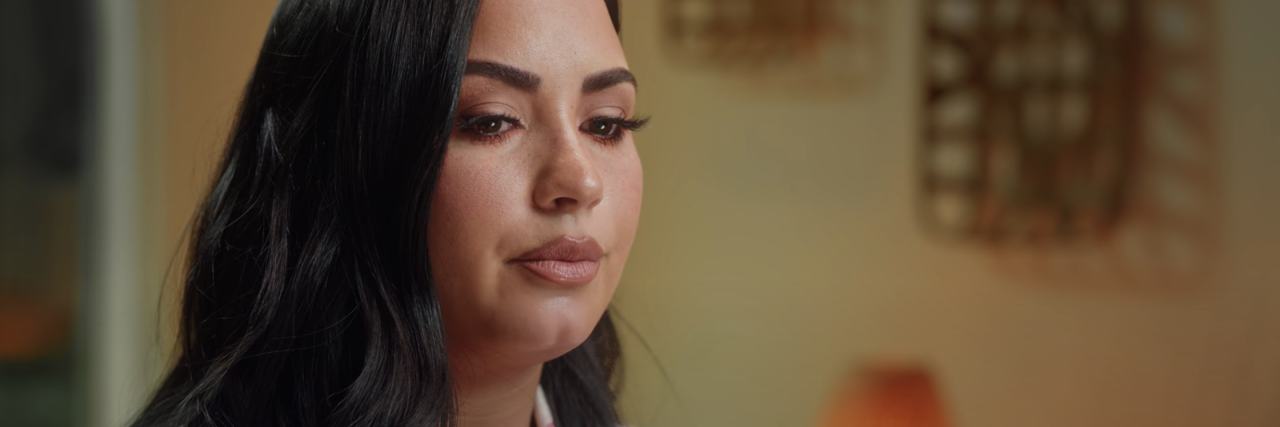Watching Demi Lovato's Docuseries #MeToo Reveal as a Trauma Survivor
Editor's Note
If you’ve experienced domestic violence or emotional abuse, sexual abuse or assault, the following post could be potentially triggering.
You can contact The National Sexual Assault Telephone Hotline at 1-800-656-4673.
You can contact The National Domestic Violence Hotline online by selecting “chat now” or calling 1-800-799-7233.
You can also contact the Crisis Text Line by texting “START” to 741741.
For the past several weeks, the internet has been buzzing over the much-anticipated four-part docuseries “Dancing With The Devil,” featuring none other than Demi Lovato.
Although I didn’t grow up watching Demi on “Camp Rock” and “Sonny with a Chance,” I did find myself immediately drawn to her music after I heard “Skyscraper” for the first time. I always found myself connecting not just with the lyrics of her songs, but the passion she puts behind everything she does. For that reason alone, I knew I wanted to watch “Dancing With The Devil.”
However, I had no idea just how much I’d connect with the heartbreaking story she shared during Episode 3, “Reclaiming Power.”
During the episode, Demi shared many details about what happened after her overdose and how it not only impacted her, but those closest to her as well. As she opened up, she shared that the night of her overdose wasn’t her last encounter with the dealer who violated her and left her for dead. Instead, she claims she decided to call him because she wanted to “reclaim her power.”
Lovato also said this wasn’t the first time she tried to “rewrite the story” after an assault… and that’s when she dropped the bombshell about her #MeToo story from her teen years.
As Demi shared her story, I found myself connecting with her in an entirely new way. Although I was far from a celebrity during my teenage years, I did live through a highly abusive relationship for over two-and-a-half years.
Like Demi, I felt very ashamed of the repeated sexual assault. I grew up in a very conservative, Catholic home and lived in the southeastern United States. My abuser attended church with his parents every Sunday and regularly helped others with no ulterior motive. He was known as a “good, Christian boy” who “stayed out of trouble” and was loved by almost every adult in our school. Who would ever believe that he was capable of any of the things he did to me?
Also like Demi, I was forced to see my abuser almost daily for four whole years after our relationship ended. We walked the same hallways between classes and shared several mutual friends. Some days, I could handle being in close proximity to him by practicing paced breathing techniques or latching onto my best friend’s arm. Other times, I would completely spiral out of control with unhealthy coping methods like self-harm — whatever I could do to calm the storm of emotions inside of me.
And, like Demi, I internalized much of what happened during that two-and-a-half-year relationship. I rewrote the narrative inside my head entirely so that I became the villain instead of the victim. I told myself I let him violate me, so it must be my fault. I convinced myself that bad things only happen to “bad” people, so I must have done something to deserve the years of emotional and sexual abuse.
While I don’t have a captivating docuseries premiering this month and I was never a child star, I do know how Demi Lovato felt (and likely still feels) in the aftermath of her rape. It’s taken me nearly two decades to open up about what happened to me and share the innermost details with my therapist, but I can honestly say that I’m finally starting my journey towards healing.
I know that Demi’s journey towards healing is only just beginning, but just like the first time I heard “Skyscraper,” I find myself once again completely awestruck and inspired by her passion and her vulnerability. So thank you, Demi. Thank you for continuing to be your authentic self and helping us all.
Image via YouTube

